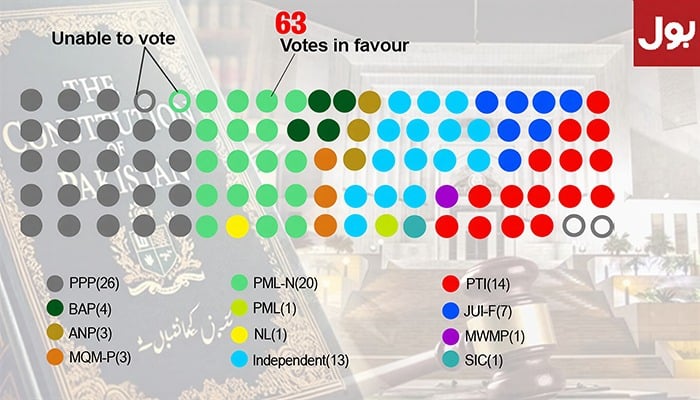Boycott fails to halt Senate passage of 27th Constitutional Amendment

Party-wise Division of Votes for 27th Constitutional Amendment.
Amid a charged atmosphere and an opposition walkout, the Senate on Monday approved the 27th Constitution Amendment bill, 2025, with a two-thirds majority securing 64 votes in favor despite loud protests from Pakistan Tehreek-e-Insaf (PTI) lawmakers.
The opposition benches erupted as members of PTI tore up copies of the bill and staged a sit-in in front of the chairman’s dais, chanting slogans against what they termed an “assault on judicial independence.”
Despite the uproar, Senate Chairman Syed Yousaf Raza Gilani proceeded with clause-by-clause voting as security staff maintained order in the House.
The Minister for Law and Justice, Azam Nazeer Tarar, presented the amendment, which seeks wide-ranging changes to Pakistan’s constitutional structure including the creation of a Federal Constitutional Court, modifications to judicial appointments, and significant alterations to the command of the armed forces.
Key Amendments and Provisions:
Among the most consequential reforms are:
Establishment of Federal Constitutional Court:
A new Federal Constitutional Court (FCC) will assume some powers currently exercised by the Supreme Court. The FCC will have exclusive jurisdiction over constitutional interpretation, and suo motu powers will only be exercised on written applications deemed constitutionally valid a move government allies claim ensures “judicial transparency and restraint.”
Judicial Appointments and Transfers:
The Judicial Commission of Pakistan (JCP) is to be expanded to include, beyond existing members, a technocrat nominated by the Speaker of the National Assembly and a woman or non-Muslim representative.
The eligibility period for High Court judges’ elevation to the FCC has been reduced from seven to five years, and the seniority of current Supreme Court judges moving to the new court will remain intact.
The JCP will also handle inter-court transfers of judges, while disputes regarding such transfers will be reviewed by the Supreme Judicial Council.
Lifetime Presidential Immunity:
In a controversial addition backed by the Pakistan Peoples Party (PPP), the amendment inserts a new clause into Article 248, granting the President lifetime immunity from prosecution or arrest, even after leaving office. Critics warn this could create a precedent for permanent legal impunity.
Restructuring of Military Command:
The Chairman Joint Chiefs of Staff Committee position will be abolished from November 27, 2025, transferring strategic command responsibilities to the CDF.
The President will appoint the service chiefs on the advice of the Prime Minister, who will also determine their remuneration.
Administrative and Revenue Reforms:
The stay period for revenue and taxation cases has been extended from six months to one year. Unresolved cases beyond that timeframe will see stays automatically vacated, a measure intended to expedite the recovery of public funds.
Opposition Outcry and Criticism:
“This amendment undermines the separation of powers and paves the way for executive control over the judiciary,” said a senior PTI senator, calling the move “a dark day for parliamentary democracy.”
Government ministers, however, defended the bill, claiming it “modernizes Pakistan’s constitutional framework” and aligns the judiciary and military structure with “contemporary governance needs.”
Next Steps:
The bill will now move to the National Assembly today for approval before being sent to the President for assent. If ratified, it will mark one of the most sweeping constitutional overhauls in Pakistan’s history reshaping the balance of power among the executive, judiciary, and military.
Read More News On
Catch all the Business News, Breaking News Event and Latest News Updates on The BOL News
Download The BOL News App to get the Daily News Update & Live News.